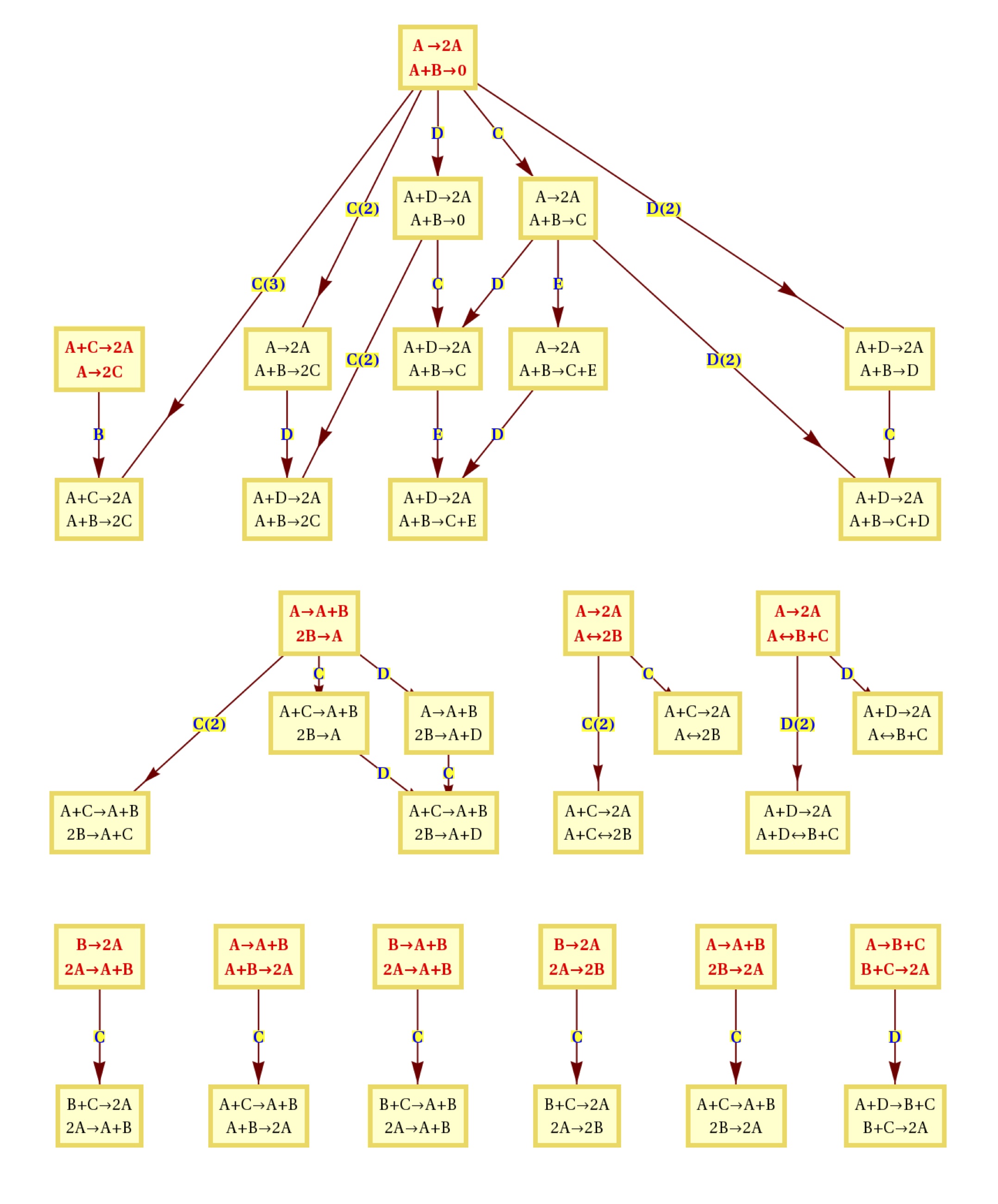Multistationarity in biochemical reaction networks
Multistationarity in biochemical reaction networks provides the mathematical underpinnings of biochemical switches. It is an important problem to determine which chemical reaction networks permit multiple positive steady states. The complexity of the problem arises due to incomplete information or high variability in the reaction rate constants.- In Simplifying the Jacobian criterion for precluding multistationarity in chemical reaction networks, we provide an algorithm to apply the Jacobian criterion of Craciun and Feinberg in order to rule out multiple steady states based on the reaction network structure independent of the reaction rate constants.
-
In Atoms of multistationarity in chemical reaction networks, we show that certain chemical reaction networks (known as CFSTRs) which have all chemical species in the inflow and outflow have a poset structure. If a multistationary CFSTR network N is determined to be embedded (in a precise sense described in the paper) in a larger CFSTR G, then G inherits the property of multistationarity.
We refer to the multistationary CFSTR networks that are minimal with respect to the number of species and with respect to the number of reactions as atoms of multistationarity. The following figure depicts (in red) all atoms of multistationarity with two reactions and molecularity of at most two along with the arrows depicting the embedding of these atoms in other multistationary chemical reaction networks.

- In Complete characterization by multistationarity of fully open networks with one non-flow reaction, I give a complete classification of CFSTR networks containing exactly one non-flow reaction (which may be reversible or irreversible). The result allows determining at a glance on whether a CFSTR network with one non-flow reaction admits multiple steady states for some reaction rate constants. Furthermore, the result allows determining multistationarity of networks with more than one non-flow reaction, if such networks have an embedding of one of the one-reaction multistationary networks.
Phase-delayed inhibition as a mechanism for decoding synchrony-encoded signals in the brain
Several brain regions encode information through synchronous activity rather than firing rate, implying that a neural mechanism must exist that is capable of decoding synchronous population activity. The simplest way to accomplish this decoding is through a high spike threshold, since synchronous spiking results in a high transient rate during synchronous activity. However, such a decoder is rarely observed in the brain. Instead, the brain employs a more convoluted mechanism of phase-delayed inhibition involving an additional intermediate population of inhibitory interneurons (compare the two figures below). I have investigated the advantages offered by phase-delayed inhibition over high-threshold detection suggesting a reason for the evolution of such a complex architecture.- In Decoding synchronized oscillations within the brain: phase-delayed inhibition provides a robust mechanism for creating a sharp synchrony filter, we use a combination of mathematical analysis and simulations to show that while in absence of noise both high-threshold detection and phase-delayed inhibition can be used for synchrony detection, in the presence of noise phase-delayed inhibition is significantly more effective. This is partly due to the fact that phase-delayed inhibition responds to the actual synchrony in the input, and not to a correlate of synchrony such as absolute spike count. In particular, independent of the actual number of input spikes, phase-delayed inhibition responds to a specific percentage of the input spikes and not the absolute number like the high-threshold detector.
- In Encoding with synchrony: phase-delayed inhibition allows for reliable and specific stimulus detection, we extended our work on the study of phase-delayed inhibition in the context of stimulus (eg. scent) detection. In the case of high-threshold detection, when reliability of stimulus detection was increased it resulted in loss of specificity of the signal detection and vice versa. On the other hand, we showed that phase-delayed inhibition can be employed to perform stimulus detection both with high reliability and specificity.
- In ongoing work with Mainak Patel (Math, Duke), we are currently examining the validity of our hypotheses and predictions in the context of a particular model system, the encoding and decoding of whisker deflection velocity within the rodent somatosensory (barrel) cortex. Barreloid neurons within the rodent thalamus are known to encode whisker deflection velocity via synchrony, higher deflection velocity results in barreloid neurons firing more synchronously while keeping the population firing rate constant. The decoder neurons convert the synchrony-based coding into a rate-based coding. This results in interesting questions related to translations between the different coding schemes.
Reciprocal inhibition as a stochastic switching mechanism
- In Switching mechanisms and bout times in a pair of reciprocally inhibitory neurons, we study the alternating activity bouts that arise when two neurons mutually inhibit each other (see figure). Inhibition and noise together result in stochastic switching between on states of the two neurons. We study the probability distribution of the activity bout times of the two neurons, including the functional dependence of the various distribution parameters on the system parameters. We show that certain system parameters provide independent control of the activity bout time of one neuron while keeping the other neuron's activity time fixed. This is consistent with experimental observations in developing animals. The study provides foundational analysis for more detailed models involving reciprocal inhibition, an instance of this is the sleep-wake switch in the brainstem of mammals.
You can find a complete list of my publications here. Go back to my homepage.